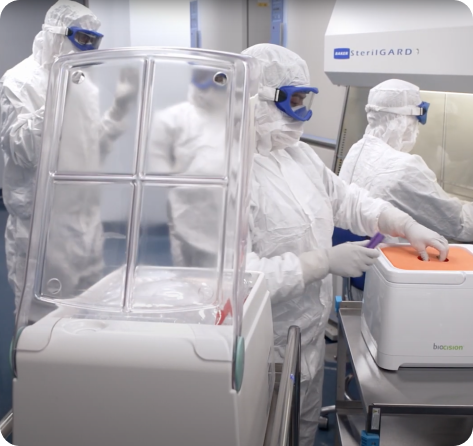Pipeline
ATA188
First cell therapy under investigation for MS.
Multiple sclerosis (MS) is a debilitating disease affecting millions, with limited treatment options and high unmet medical need in progressive forms. Evidence shows that Epstein-Barr virus is the leading cause of MS, which is why Atara is investigating the potential of our EBV T-cell technology platform to treat progressive forms of the disease.
-
Clinical inroads for those with progressive MS.
EBV is the leading cause of MS and is both necessary for and precedes diagnosis of MS, with prior EBV infection increasing susceptible individuals' risk of developing MS 32-fold.1,2 Specifically targeting EBV-infected B cells and plasma cells represents a new targeted, investigational approach.
-
 Mitch, living with primary progressive multiple sclerosis, MS advocate
Mitch, living with primary progressive multiple sclerosis, MS advocate
An off-the-shelf, allogeneic approach.
Most treatment options for relapsing-remitting MS (the most common form) that work well in reducing flares have not been shown to be effective in slowing disability worsening in progressive forms of the disease. ATA188 is an investigational, off-the-shelf, allogeneic, EBV T-cell immunotherapy that targets EBV-infected B cells and plasma cells, including those within the central nervous system, that are believed to cause MS.
-
What is progressive multiple sclerosis (PMS)?
-
Progressive multiple sclerosis currently affects up to 1.2 million people worldwide.3-6 People with PMS experience worsening symptoms as well as deteriorating physical disability. Two conditions sit under the Progressive MS disease category: Primary PMS (PPMS) and Secondary PMS (SPMS). PPMS is defined by progressive disease without an initial relapsing/remitting phase—around 15% of newly diagnosed cases are PPMS. SPMS begins with the most common form, relapsing-remitting MS, but develops into a progressive form. Up to 80% of people with RRMS will eventually develop SPMS.
-

-
Making bold strides forward.
In the fall of 2017, we initiated an open-label, single-arm, multi-center, multi-national Phase 1 trial with investigational ATA188 for progressive MS. The objectives of this Phase 1 study were to assess the safety and clinical outcomes of ATA188 in patients followed for at least one year after the first dose. The Phase 2 EMBOLD clinical study investigating ATA188 for the treatment of patients with progressive forms of MS has completed.
Stay up to date.
-
References
-
- 1. Lanz, T. V., Brewer, R. C., Ho, P. P., et al. (2022). Clonally expanded B cells in multiple sclerosis bind EBV EBNA1 and GlialCAM. Nature, 603(7900), 321–327
- 2. Bjornevik, K., Cortese, M., Healy, B. C., et al. (2022). Longitudinal analysis reveals high prevalence of Epstein-Barr virus associated with multiple sclerosis. Science, 375(6578), 296–301
- 3. Atlas of MS, MS International Federation
- 4. Confavreux C, Vukusic S. Natural history of multiple sclerosis: a unifying concept. Brain. 2006;129(Pt 3):606-616
- 5. National Multiple Sclerosis Society. Accessed December 23, 2021. Types of MS | National Multiple Sclerosis Society (nationalmssociety.org)
- 6. Salter A, Thomas NP, Tyry T, Cutter GR, Marrie RA. A contemporary profile of primary progressive multiple sclerosis participants from the NARCOMS Registry. Mult Scler. 2018;24(7):951-962